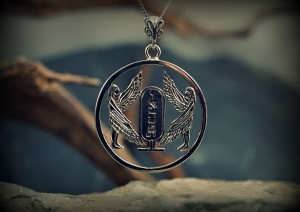The New Divine Commandment and a wonderful Story
Sterling Silver Version – http://goo.gl/eBqvOu
Solid Gold Version – http://goo.gl/vA7yy0
Our story this time takes place in the land of Israel in the latter part of the 1st century and the first part of the 2nd. During the reign of the Roman Empire.
Our protagonist is Akiva ben Joseph, a poor uneducated shepherd of humble parentage working for the richest man in Jerusalem, Kalba Savua. The name kalba Savua is an ancient Aramaic nickname which is derived from the fact that a poor person would enter his home, as famished as a dog (“kalba” is Aramaic for dog), and would emerge after a hearty meal with a full belly (“savua” is linked to “save’a,” which in Hebrew means sated).
Kalba Savua’s daughter Rachel noticed how modest Akiva was and how fine a person he was. She said to him: “If I agree to be your wife, will you study Torah in the beit midrash [school for the study of Torah]?” He replied, “Yes”. Their wedding ceremony was carried out clandestinely. When Kalba Savua found out about the marriage he banished her from his house, cutting her off from all his assets.
The legend goes on to tell us of the difficulties faced by the young couple. They settled in a barn. In the morning, when the daughter awakens, she finds that her hair is full of straw. Her new husband picks out the straw from her hair and promises her that, if he had enough money, he would give her a “Jerusalem of gold”, a famous gold ornament/pendant at that time.
In order to persuade the bride that their situation is not so dire, Elijah the Prophet appears in the guise of a poor begger and asks them for a little straw for his wife who is about to give birth. Rabbi Akiva says to his wife, “You see this person? He does not even have a bit of straw.”
Rachel says to her husband, “Go and study Torah in a beit midrash.” Rabbi Akiva obeys her wishes and sets off on his journey to learn Torah. Twelve years pass and he returns home accompanied by 24,000 students.
All of the townspeople come out to greet him. So does his wife, who appears in ragged clothes and who refuses to heed the advice of her neighbors who suggest that she borrow suitable attire. When his students catch sight of her, they try to prevent her from approaching Rabbi Akiva. However, he immediately calls a stop to their efforts (using one of the shortest and most beautiful statements to describe their mutual relationship): “What is mine and what is yours – belongs to her!”

